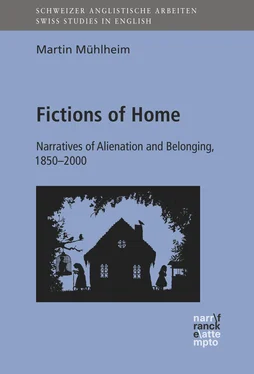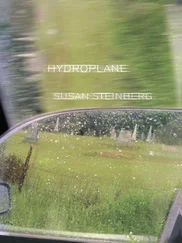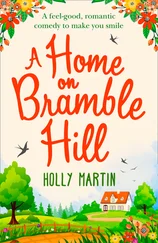More specifially, Eliot’s novel dismantles a central convention of the English BildungsromanBildungsroman : its valorization of childhoodchildhood, commonly expressed in endings that depict the protagonist’s fairytale-like return to his or her original home. As Franco MorettiMoretti, Franco has pointed out, the hero’s childhood is not only granted an emblematic prominence in the English Bildungsroman ; in contrast to continental examples of the genregenre, the protagonist’s most significant experiences also tend to be “those which confirm the choices made by childhood ‘innocenceinnocence’” ( Way of the World 182; emphasis added):
Can you picture a child reading Wilhelm Meister , The Red and the Black , Lost Illusions ? Impossible. But Waverley and Jane Eyre , David Copperfield and Great Expectations : here we have the ‘great traditiontradition’ of childrenchildren’s literature (and our era, less intimidated by sex, can easily add Tom Jones ). […] Could it in fact be that, deep down, these novels are fairy tales? ( Way of the World 185)
In the fairytale world of the English BildungsromanBildungsroman , MorettiMoretti, Franco points out, siblings often “magnetically attract the negative values of the narrative universe,” as part of a broader tendency towards moral polarizationpolarization into clear-cut rights and wrongs ( Way of the World 186). If continental heroes are happy to leave (and even deliberately defy) their childhoodchildhood homes, the youthful journeys of English protagonists are portrayed as enforced exileexile: “a long and bewildering detour” from the cherished stabilitystability of the original home ( Way of the World 203).123 The basic structure of the English Bildungsroman is, in short, regressiveregression, and the often unlikely or even blatantly unrealistic plot twists needed to manufacture a happy ending – the rediscovery of long-lost relativesrelatives, or Rochester’s voice supernaturally calling out to Jane Eyre over the distance of several miles – reveal the extent to which the endings of such novels are concerned, not with reality, but with poetic justicepoetic justice and wish-fulfillmentwish-fulfillment. And of course, almost all of this is true for The Mill on the Floss , too: the sibling who attracts the negative values of the fictional universe (i.e. Tom); the protagonist’s aversion to the idea of having to leave the childhood home; and the restoration of an ‘innocent’ childhood perspective through the reconciliation of Tom and Maggie, brought about by the flagrantly fantasized flood that concludes the novel. There is only one problem with this argument in connection with The Mill on the Floss : its ending may be just as fantasized as all the others – but it is not truly a happy one. How can we make sense of this fantasyfantasy of doom?
Using Slavoj ŽižekŽižek, Slavoj’s Lacanian framework as an analytical tool, we can say that Eliot’s novel ‘traverses the ideological fantasyfantasy’ that structures the English BildungsromanBildungsroman , and in doing so confronts the generic traditiontradition’s traumatic kernel. Here is how ŽižekŽižek, Slavoj defines fantasy:
Fantasy conceals the fact that the Other, the symbolic order, is structured around some traumatic impossibility, around something which cannot be symbolized […] – so what happens with desiredesire after we ‘traverse’ fantasyfantasy? Lacan’s answer, in the last pages of his Seminar XI , is drive, ultimately the death drivedeath drive: ‘beyond fantasy’ there is no yearning or any kindred sublimesublime phenomenon, ‘beyond fantasy’ we find only drive, its pulsation around the sinthomesinthome . ( Sublime Object of Ideology 138–139; original emphasis)
For Lacan, fantasyfantasy serves to hide a traumatic kernel, and if we traverse it we will be confronted with the pulsation of the death drivedeath drive around the so-called sinthomesinthome , which ŽižekŽižek, Slavoj defines as “a knot, a point at which all the lines of the predominant ideological argumentation […] meet” ( The Ticklish Subject 206). This is a potentially liberating encounter, for ŽižekŽižek, Slavoj suggests that if we untie the sinthome , then the efficiency of the corresponding ideological edifice is suspended (ibid.). Given that, for ŽižekŽižek, Slavoj, ironicirony distance is one of the key ways in which we can “blind ourselves to the structuring power of ideological fantasy” ( Sublime Object of Ideology 30), we may therefore speculate that abandoning ironyirony may be one way to confront the traumatic kernel of ideological fantasies.
If we now apply this theoretical framework to Eliot’s novel, then we can say that The Mill on the Floss manages to traverse the regressiveregression fantasyfantasy of childhoodchildhood that lies at the core of the English BildungsromanBildungsroman precisely through its progressive abandoning of ironicirony distance, which is why the – expected and conventionalconventions – fairytale happy ending turns into a sublimesublime depiction of a pulsating, semi-incestuousincest death drivedeath drive:
Tom, looking before him, saw death rushing on them. Huge fragments, clinging together in fatal fellowship, made one wide mass across the stream.
“It is coming, Maggie!” Tom said, in a deep, hoarse voice, loosing the oars, and clasping her.
The next instant the boat was no longer seen upon the waterwater [… B]rother and sister had gone down in an embrace never to be parted […]. (422; bk. 7, ch. 5)
Maggie is reunited with Tom, who in the course of the narrative has come to embody the Law of the Father, and both are obliterated in what one could call a literal ‘stream of unconsciousnessstream of consciousness’: a fantasized Liebestod in the flood unleashed by Maggie’s death drivedeath drive.124 Once we foreground this submerged psychological drama, it seems almost too fitting that, in the course of the novel, Eliot’s narrator incorporates references to two of psychoanalysispsychoanalysis and psychoanalytic criticism’s favorite tragic narratives: Sophocles’s Oedipus and ShakespeareShakespeare, William’s Hamlet (110 and 325; bk. 1, ch. 13 and bk. 6, ch. 6).
More than merely referring to these tragedies in passing, however, the narrator of The Mill on the Floss in fact launches a systematic analysis of the genregenre of tragedytragedy and its relation to the story of Maggie and her family. Early on in the novel, Maggie already suspects that Tom’s character and actions might make the “future in some way tragic” (15; bk. 1, ch. 3). Later, the narrator compares Maggie to the tragic hero of Sophocles’s play Ajax (56; bk. 1, ch. 7) and even points explicitly to Aristotle’s discussion of tragedy in his Poetics (85; bk. 1, ch. 10). At another point, the narrator challenges received ideas about the genre, relating this critique to more general problems of novelistic representationrepresentation:
Mr. Tulliver, you perceive, though nothing more than a superior miller and maltster, was as proud and obstinate as if he had been a very lofty personage, in whom such dispositions might be a source of that conspicuous, far-echoing tragedytragedy, which sweeps the stage in regal robes, and makes the dullest chronicler sublimesublime. The pride and obstinacy of millers and other insignificant people, whom you pass unnoticingly on the road every day, have their tragedy too; but it is of that unwept, hidden sort that goes on from generation to generation, and leaves no record – such tragedy, perhaps, as lies in the conflicts of young souls, hungry for joy, under a lot made suddenly hard to them, under the dreariness of a home where the morning brings no promise with it, and where the unexpectant discontent of worn and disappointed parents weighs on the childrenchildren like a damp, thick air, in which all the functions of life are depressed; or such tragedy as lies in the slow or sudden death that follows on a bruised passion, though it may be a death that finds only a parish funeral. (163; bk. 3, ch. 1)
Читать дальше












